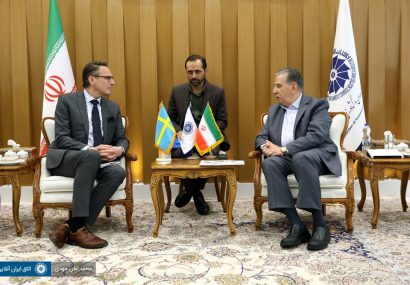Iran Invites Sweden to Revive Joint Investment Programs in Automotive, Power Sectors
TEHRAN (Iran News) Speaking during a meeting with Sweden’s ambassador to Iran, Samad Hassanzadeh, President of the Iran Chamber of Commerce, Industries, Mines, and Agriculture, emphasized that both countries’ commercial ties could return to previous levels — or even surpass them — with collaborative effort from their embassies and respective chambers of commerce.
“Iran welcomes the entry of Swedish foundational technologies into the country,” Hassanzadeh stated. “We have had a successful experience with Swedish joint investments in the automotive industry and industrial units in the past, and we hope to repeat that success.”
He highlighted Iran’s vast potential in various sectors, including petrochemicals, oil refining, pharmaceuticals, agriculture, food and dried fruits, handicrafts, and carpets. With competitive pricing in Iran, he suggested that Swedish companies consider participating in large-scale projects such as the development of power plants.
Commenting on the ongoing diplomatic talks between Iran and the United States, Hassanzadeh noted a shift in the Iranian government’s approach toward expanding international relations. “Given the positive outlook for negotiations, we believe closer ties with Sweden and other European nations are within reach. I am confident the talks will conclude favorably for all involved,” he said.
Despite sanctions, Hassanzadeh pointed out that foreign companies have been able to engage in joint ventures in sectors not subject to restrictions, with the Iranian government providing the necessary guarantees for capital returns and profit repatriation.
As the representative of Iran’s private sector, Hassanzadeh formally invited the Swedish ambassador to help explore the revival of previously successful joint ventures, such as the Volvo automobile production project. He requested a detailed report on existing barriers to be submitted to the Iran Chamber, promising full cooperation to resolve them.
He also extended an invitation to the President of Sweden’s Chamber of Commerce to lead a business delegation to Iran. “Such a visit would facilitate greater mutual understanding and foster commercial ties between Iranian and Swedish businesses,” Hassanzadeh noted. He added that the formation of a joint Iran-Sweden chamber of commerce would be a valuable step toward enhancing bilateral cooperation.
Sweden’s ambassador to Iran, Mattias Otterstedt, responded positively, expressing confidence in the complementary nature of the Iranian and Swedish economies. He identified several promising areas for collaboration, including heavy vehicle manufacturing, power generation, telecommunications, pharmaceuticals, steel, and mining.
However, Otterstedt acknowledged ongoing difficulties in financial transactions and banking due to international sanctions. “We hope the negotiations will lead to the lifting of sanctions so we can revive our economic relations,” he said.
He also pointed out that sanctions imposed over a decade ago had led to a generational gap in commercial experience. “Many of the experienced businesspeople have left the field, and some institutional knowledge has been lost. It is now up to both countries’ chambers of commerce to revive that experience and share information.”
Otterstedt emphasized that some trade obstacles are indeed surmountable and expressed Sweden’s intention to build new networks with Iran’s private sector. “If sanctions are lifted, and considering the tariff wars sparked during the Trump era, manufacturers will certainly look for new production hubs — and Iran will be a strong candidate,” he concluded.
- source : IRAN NEWS ECONOMIC DESK






























